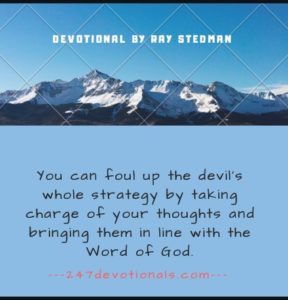Table of Contents
Topic:Prayer’s Anchor
Then Abraham approached him and said: Will you sweep away the righteous with the wicked?
Gen. 18:23

Abraham has been informed that the hour of judgment for Sodom has come. He is appalled by this, but it is very important for us to see what is really troubling him. If you ask, Is Abraham really trying to save these cities? the answer has to be, No, that is not really his concern. Abraham knows that God’s hour of judgment has struck, that there has been long record of his patience up to this point. He knows that it is only unrighteousness that will ultimately be judged, so he is not trying to save the cities. He expresses his concern in these words: Will you sweep away the righteous with the wicked? Are you going to treat righteous people the same way you treat wicked people? That is what is troubling him.
There is a cold fist of fear gripping the heart of Abraham. He fears he is going to find that God is not quite who he thought he was. Perhaps he understood that righteous people have a way of salting the world, preserving it from corruption and from judgment. Perhaps he is troubled that if God destroys a whole city full of wicked people, with some righteous among them, the word will go out that righteousness is of no effect and a wrong impression will be left. Abraham has a troubled heart, questioning whether God really is the kind of God he has thought him to be.
Have you ever felt that way? In your prayers, or in your confrontation with life, have you suddenly seen God moving in ways you did not anticipate, allowing things to happen that you did not think he ought to allow? Have you thought, Lord, can you really do this? Shall not the Judge of all the earth do right? This is not right. We are getting very close to how Abraham felt at this point, when we sense that sudden horror that God is not going to act as we expected him to. Abraham is really raising the question here, Does righteousness make any difference? If God wipes out these cities filled with both wicked and righteous people, if they are all treated alike, isn’t it telling us that righteousness really does not make any difference?
In the rest of his prayer, you can see how timidly he ventures, Lord, just a moment. Supposing there are fifty righteous in that city, will you then destroy it? Immediately the response comes, No, I’ll not destroy it for fifty. Again, timidly he ventures. How about forty-five? No, says God immediately, if I find forty-five I won’t destroy it. Then Abraham girds up his courage and says. Lord, now don’t get upset, but I’m going to press this a little further. How about forty, or thirty, or twenty? Finally, he goes as far as he dares, feeling the end of his sense of concern when he says, Lord, how about ten? If there are ten righteous will you save them and the city? God’s immediate response, as all along is, As far as you go, Abraham, I will go. If there are ten righteous I will not destroy the city.
Each prompt answer of God eases the fist of fear that is gripping Abraham’s heart. Each answer is a reassurance that God will honor his promise, that he will preserve the righteous in the hour of crisis and danger. Abraham is reassured that God means what he says, that righteousness does make a difference, that God’s promises are valid in the hour of crisis, and that he does not treat the righteous as he does the wicked. When he reaches that place, Abraham is satisfied.
Lord, thank you that you have given to me great promises of love, acceptance, guidance and protection. I pray that as the world watches the righteousness in its midst, they will see that your hand and your heart are committed to those who respond to your offer of grace, and your judgment awaits those who resist the patient pleading of their God.
Life Application
Since it is obviously true that our minds cannot fully contain all God is, does that limitation diminish our trust in his response to our prayers? Do we fully trust what has been revealed in his Word, and trust him to act accordingly?
